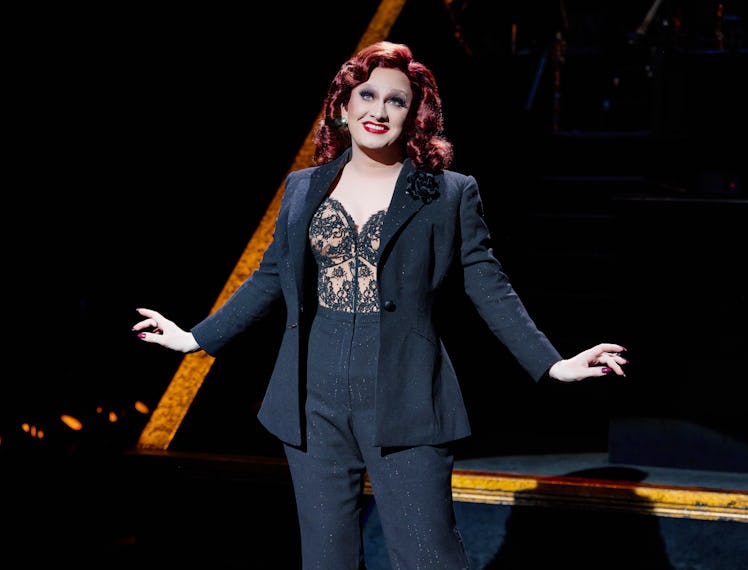Jinkx Monsoon Was Always Destined to Make Broadway History
The Drag Race alum made her debut in the musical Chicago last month—but has chased her onstage dreams for decades.

Jinkx Monsoon has developed a bit as part of her entrance to the Broadway musical Chicago. As the enterprising hustler Mama Morton, the red-headed drag star recently stepped onstage for the opening night of her eight-week run in the role—to raucous, show-stopping applause. For the first few seconds, she simply stood there, soaking it all in as the applause grew into a thunderous standing ovation. After what felt like a few minutes, ever the performer, Jinkx pulled out a pocket watch and checked the time. Now, it’s a shtick she’s pulled night after night, whipping out her timepiece after the enthusiastic, extended acknowledgement of her presence in the longest-running play on Broadway.
But when you ask the actor—who won the sixth season of RuPaul’s Drag Race in 2013 before beating out eight other franchise winners in last year’s All Stars edition and crowned the Queen of Queens—about the crowd’s reaction, she remains coy.
“With the way the world is right now, the way we collectively feel after years of bullshit and the worst parts of the last decade, audiences are just excited to be seeing shows again,” she tells W eight days into her Broadway debut. “Opening night, the Chicago cast got to feel what it’s like performing in front of a drag audience. And honestly, it’s been carrying throughout [the week.]”
Jinkx Monsoon as Mama Morton in Chicago.
But that sentiment, however poignant, is also something of a deflection. Jinkx’s arrival on Broadway is historic: she is the first drag queen and first trans person to play Mama Morton there, picking up the torch from other trans folks and drag performers like Peppermint, Angelica Ross, and Varla Jean Merman. But it is also the culmination of a decade-plus-long journey for the Oregon native—who stated that her personal goal was always to appear on Broadway. “It’s been my life’s dream ever since I started doing drag,” she told RuPaul over a Tic Tac brunch in an episode of the drag reality competition. And now, that dream is coming true.
When Jinkx was first introduced to national audiences, it was by way of her first run on Drag Race. She described herself as “Seattle’s premiere Jewish narcoleptic drag queen” and made an early name for herself as both a comedy queen as well as a theater queen with an aesthetic that sourced inspiration from decades past. (Over the years, I’ve come to describe her to others as “that one drunk, slightly washed-up friend who gets on the mic at karaoke and reminds you ‘Oh, she did win those two Tonys.’”) Hers is a talent that is exceedingly thoughtful while also unassuming. Her impersonation of Grey Gardens’s Little Edie has reached legendary status among the show’s fandom. And it’s been surpassed by another impression of hers: one of Judy Garland. But her reticence to stand in her talent, deflecting praise or education with self-critique, rubbed some of her competitors the wrong way—in the world of drag, often characterized by an almost necessary sense of delusion and self-importance, her humility seemed an affectation.
“I used to think you had to be super humble or you’re a bitch,” she explains now. “I would take that to the extreme. Now, I have a hard time accepting compliments because I don’t want a big head. I just want to do the work.”
It hasn’t been easy. Jinkx got into drag through theater: she started putting on hair and makeup in order to play the women in the roles she saw on stage—namely, in productions like Chicago. (Jinkx’s persona and the production are so similar that Drag Race often soundtracked her moments with vampy vaudeville tracks akin to “All That Jazz.”) At a young age, she got involved with local productions before graduating from Cornish College of the Arts with a BFA in theater. And then, a decade ago, came Drag Race.
“[This is] not really a school for girls, it’s a competition for the best of the best,” one of Jinkx’s competitors said in an episode of the show, in reference to her lack of aesthetic polish. But Jinkx won the season, anyway.
She hit the post-show circuit by joining touring specials and roasts. She struck gold with a popular holiday special with fellow Drag Race alum Ben De La Creme that eventually became a Hulu film. But the Broadway dream was never forgotten.
As the Mistress of Murderers’ Row in Chicago, Jinkx plays a character with clear similarities to her own persona. The performer describes Morton as a butch, queer coded woman who uses the cards life has dealt her as a prison warden to realize her dream of being a manager in the top-dollar entertainment industry. Similarly, as a transfemme nonbinary drag queen, Monsoon has played the cards available to her to build not only a future, but the one she feels she deserves.
“If you have to subcategorize [drag queens and our talent,] whatever,” she says. “We are showing that we might choose to use [our talents] in drag, but that doesn’t mean we are doing it at any lower of a level than anyone else. Once the world catches up with that and stops subcategorizing us, the sky is really the limit.”